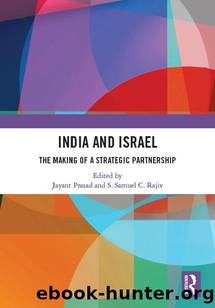India and Israel by Unknown

Author:Unknown
Language: eng
Format: epub
Publisher: Taylor and Francis
Published: 2020-06-29T00:00:00+00:00
Post-1992 strategic trajectory
Since January 1992, political, economic and above all military-security relations between the two have been flourishing.20 In the initial years, the military ties were confined to upgrading of ageing MiG aircraft and supply of fast patrol boats. Gradually, they expanded into avionics, border management, small arms, missiles, anti-missile systems and counterterrorism. Both entered into joint research in missile defence and India launched an Israeli satellite in 2008. Until February 2015 there have been no visits by defence ministers from either side, service chiefs and heads of various intelligence and security institutions have been periodically visiting one another. The US, which in the past encouraged India to normalise relations with Israel, has been accommodative and was supportive of Indo-Israeli military cooperation. This was different from Washingtonâs pressure tactics vis-Ã -vis the Israeli supply of the Phalcon Airborne Warning and Control System (AWACS) to China.21 By the early 2000s, Israel had emerged as a major arms supplier to India and the latter as Israelâs principal market.
However, depicting the Indo-Israeli ties as âstrategicâ merely because of arms trade and other forms of security cooperation would be inaccurate on two counts. One, there is considerable political opposition within India to closer ties with Israel, especially in the military-security arena; and two, to circumvent the ideology-driven opposition which frequently crops up during periodic tension and violence in West Asia, Israel has to focus on and prioritise non-political areas.
Moreover, quarter of a century after normalisation, the two countries do not have a shared worldview, especially vis-Ã -vis West Asia. Diplomatic relations have not modified or diluted New Delhiâs position on some of the key issues of the Arab-Israeli conflict, namely Palestinian statehood, borders, settlements or the Jerusalem question. With the notable exception of the vote in July 2015 in the UN Human Rights Council (UNHRC) over the Gaza crisis of 2014, Indiaâs voting pattern in the UN and other multilateral agencies has not changed.22 As highlighted by the UNESCO vote in April 2016, India continues to support the traditional Arab-Islamic position regarding Jewish religious claims to the old city of Jerusalem. India however abstained during the second vote in October. In early 2017, however, one could notice a subtle change in India's policy and during the visit of President Mahmous Abbas it avoided any direct reference to East Jerusalem being the capital of the future Palestinian state.
More over, one cannot ignore the not too insignificant changes in Indiaâs position favourable to Israel. Unlike the pre-1992 phase, India has been urging both parties to the Arab-Israeli conflict to seek a political solution through negotiations and has been opposed to any unilateral moves by either side. It no longer blames Israel for all the problems but has been adopting a more nuanced position towards violence in the region. The bilateral differences are more pronounced over the Iranian nuclear controversy. India did not share the position and strategies of Israel and was opposed to any military solution to the problem. Despite the negative impact upon its relations with the
Download
This site does not store any files on its server. We only index and link to content provided by other sites. Please contact the content providers to delete copyright contents if any and email us, we'll remove relevant links or contents immediately.
| Africa | Americas |
| Arctic & Antarctica | Asia |
| Australia & Oceania | Europe |
| Middle East | Russia |
| United States | World |
| Ancient Civilizations | Military |
| Historical Study & Educational Resources |
The Battle of Mogadishu by Matt Eversmann & Dan Schilling(754)
The Confidence Men by Margalit Fox(708)
The Spymaster of Baghdad by Margaret Coker(675)
A History of the Muslim World since 1260: The Making of a Global Community by Vernon O. Egger(672)
Jack the Ripper and the East End by Peter Ackroyd(635)
Empire of Fear: Inside the Islamic State by Andrew Hosken(623)
The Afghanistan File by Prince Turki AlFaisal Al Saud(613)
Islam At The Gates: How Christendom Defeated the Ottoman Turks by Diane Moczar(608)
Akhenaten by Dominic Montserrat(608)
The Crimean War by Winfried Baumgart(603)
The Jerusalem Diamond by Noah Gordon(595)
Beirut 2020 by Charif Majdalani(591)
The History of Jihad by Robert Spencer(587)
A Concise History of Greece (Cambridge Concise Histories) by Richard Clogg(584)
The Privatization of Israeli Security by Shir Hever(561)
Enemy in the East by Rolf-Dieter Müller(559)
Israel: Ancient Kingdom or Late Invention? by Daniel I. Block(557)
The Nine Lives of Pakistan by Declan WALSH(553)
Destroying a Nation: The Civil War in Syria by Nikolaos van Dam(548)
